Cafetalk is an online tutoring and skills platform founded in 2010. It offers 1:1 video lessons in many subjects and languages. This article examines Cafetalk’s reviews, pricing, features and how it compares to alternatives. Our goal is to help students and parents compare platforms and make informed decisions when choosing tutoring services.
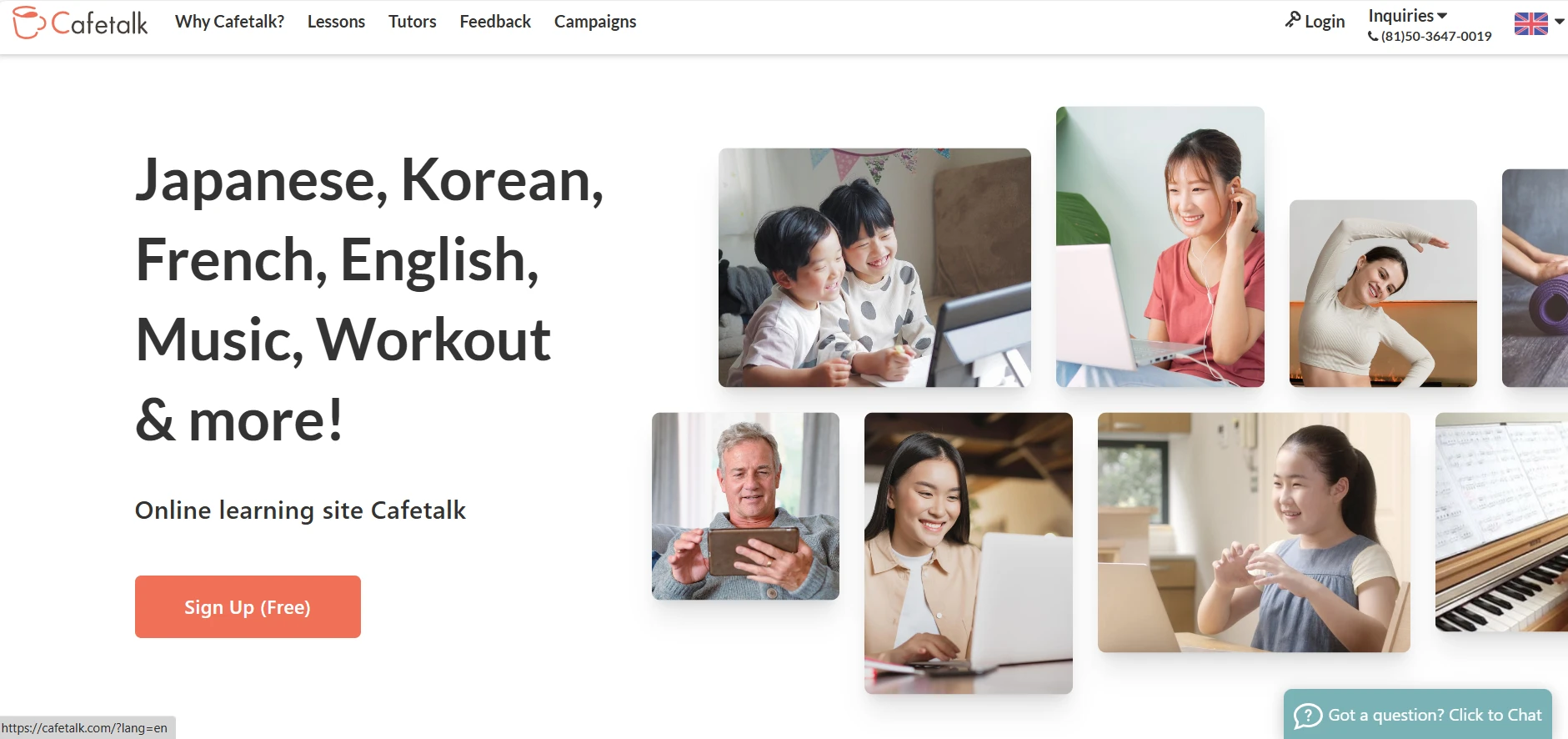
Cafetalk Reviews and Testimonials
Indeed (Cafetalk reviews): Cafetalk’s Indeed page shows about 9 reviews with an average of 3.6/5. Tutors there praise Cafetalk’s flexibility and support, noting they can set their own schedule and price. Many reviews mention helpful support staff. However, common complaints are about low pay (Cafetalk’s 40% commission) and not enough students. For example, one tutor wrote they worked a year on the site but “you won’t make any money, or very little”.
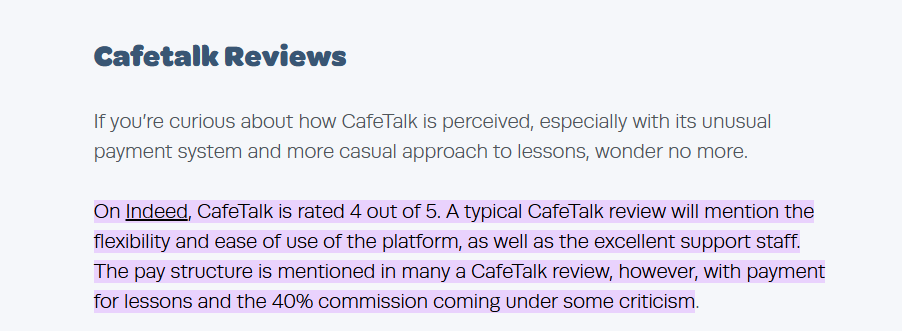
Glassdoor (employee reviews): On Glassdoor Cafetalk has a rating around 3.4/5. Employees report a friendly atmosphere and good student base, but again low pay is a theme. Several reviews note the support and culture are good, but many say “pay is a problem” and it’s hard to get stable booking.
Reddit (r/OnlineESLTeaching): Informal tutor forums echo these issues. On Reddit, many teachers call Cafetalk a “total waste of time” with few students or income. One teacher said they earned essentially “zip” in a year, and others report only a handful of initial students and then nothing. These threads highlight tutors’ frustration with earnings and workload on Cafetalk.
Official Cafetalk Site: Cafetalk’s own website highlights tutor success stories (for example, an interview with tutor Jenny F.). These curated testimonials emphasize positive experiences (engaging lessons, loyal students). However, they are marketing pieces and don’t include any negative feedback or ratings. The site does not provide an overall review score or full user comments.
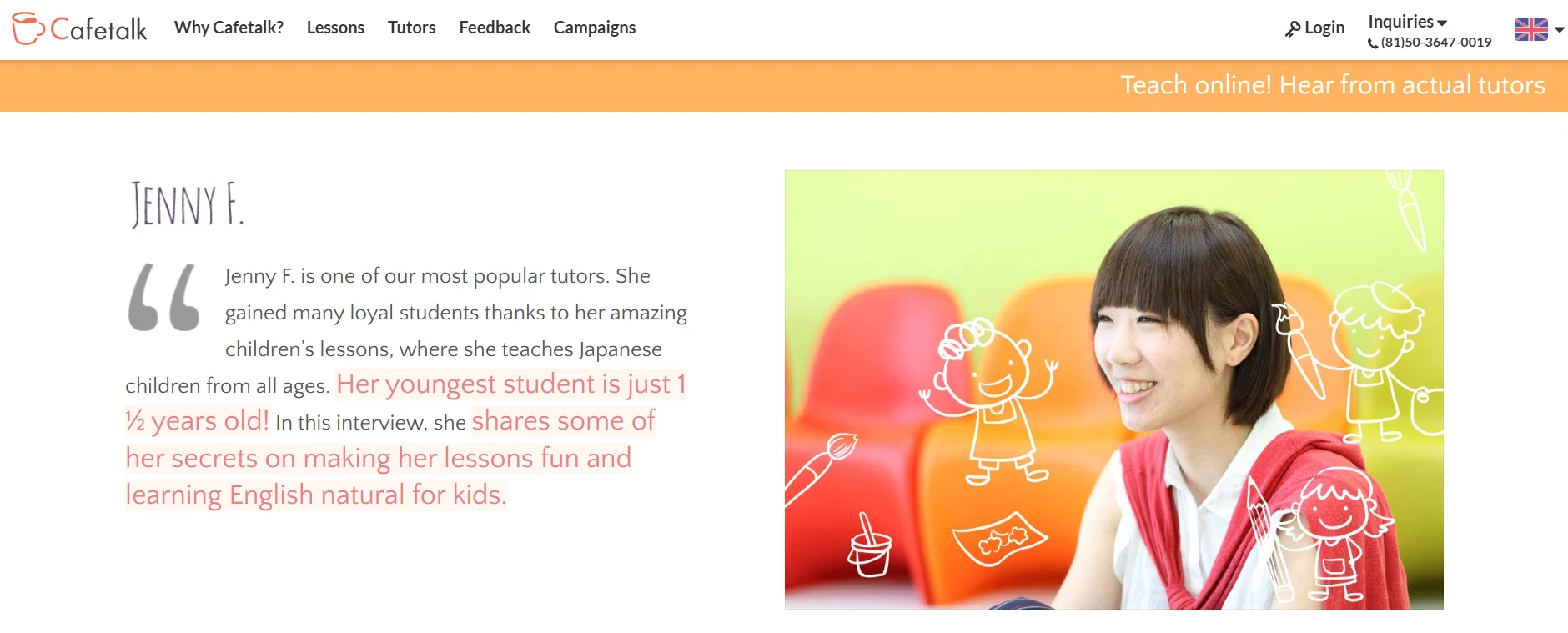
Is Cafetalk legit? Based on the above, Cafetalk is a real, established platform (backed by Small Bridge Inc). Most comments describe actual experiences rather than scam warnings. Reviewers repeatedly call it “legitimate” and note its long history and wide reach. No sources suggest it’s fraudulent. In summary, Cafetalk appears legitimate: it offers real tutors and payments, but users should be aware of its policies (especially on refunds).
Summary: Cafetalk has mixed feedback. Users appreciate its wide variety of lessons and flexible pay-per-lesson model, but many warn that tutor pay is low (due to 40% commission) and bookings are sparse. Students like that there’s no subscription fee, only pay-per-lesson, and praise the friendly support team. The platform is legitimate and well-regarded for support, but both tutors and students mention drawbacks in pricing and refunds.
Cafetalk Pricing
Pricing Range
Cafetalk uses a prepaid points system (1 point = 1 JPY ≈ $0.01). Most lessons are priced between 1500–3900 points per hour (about $15–$39), though the full range is roughly 1000–5000 points ($10–$50). Tutors set their own hourly rates. The platform’s commission is 40% initially (so tutors get 60% of each lesson fee). As tutors teach more, their share can increase for heavy-volume tutors it can rise above 77% (meaning the platform takes ~22%). In practice, easy or common subjects like basic conversation often cost at the lower end ($10–$20), while specialized tutors (e.g. advanced languages or music) charge more (sometimes $30–$50). An affiliate source notes typical Cafetalk tutors charging about $12–$36/hr, aligning with these figures.
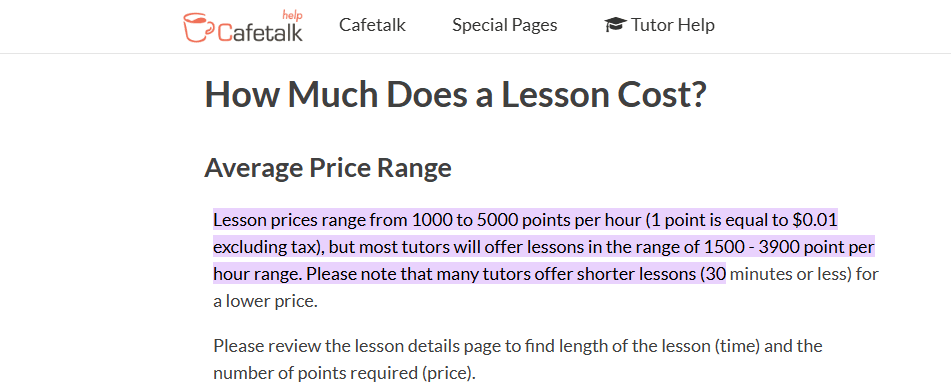
What students say about Cafetalk Pricing
Students generally find Cafetalk’s pay-per-lesson pricing fair. They like no recurring fees—you simply buy points and only pay for each lesson taken. Compared to global tutoring sites, Cafetalk’s rates are in line: for example, italki tutors range $4–$80/hr and Preply tutors ~$10–$40/hr. Reviews note Cafetalk prices are reasonable given the flexibility (you can pick tutors at many price points). Many appreciate that even top tutors still cost much less than in-person services. However, some students feel the risk is that tutors might cancel and take fees, making costs feel less justified in hindsight.
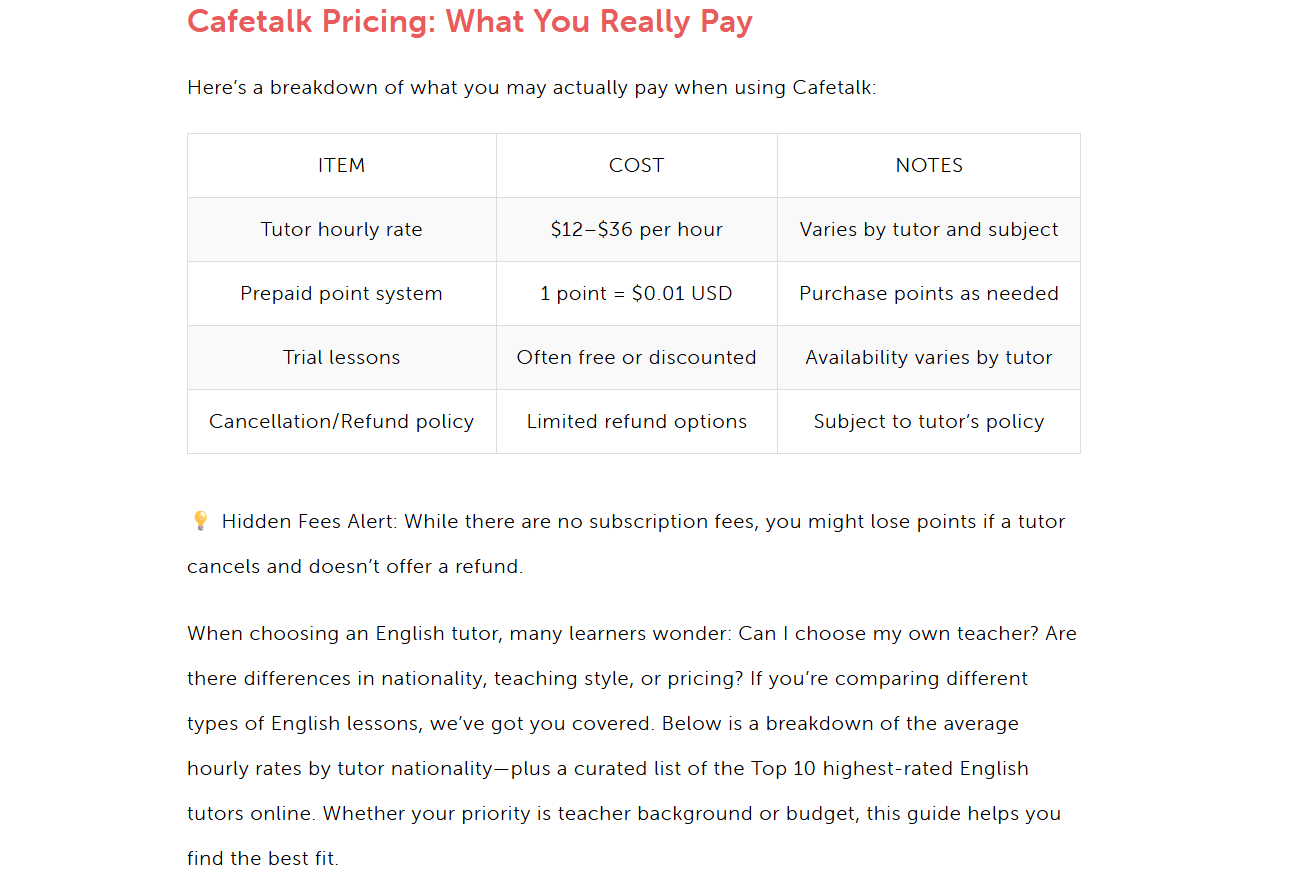
Hidden costs
There are no registration or membership fees. The only payments are for lesson points. Points can be purchased in blocks (500 points ≈ $5.20), with small discounts on large purchases (up to ~5% off at 40,000-point packs). The main “hidden” cost is that cancellation rules can eat fees. If a tutor cancels a confirmed lesson, you get a full refund. But if you cancel within 24 hours, the tutor may still charge 50–100% of the fee. Also, lesson packs (bundles of lessons) that are canceled after starting only refund 50% of remaining points. There are no other sneaky fees. One caveat: because points are JPY, students paying in USD/EUR may face currency conversion, and tutors note income can drop when the yen weakens.
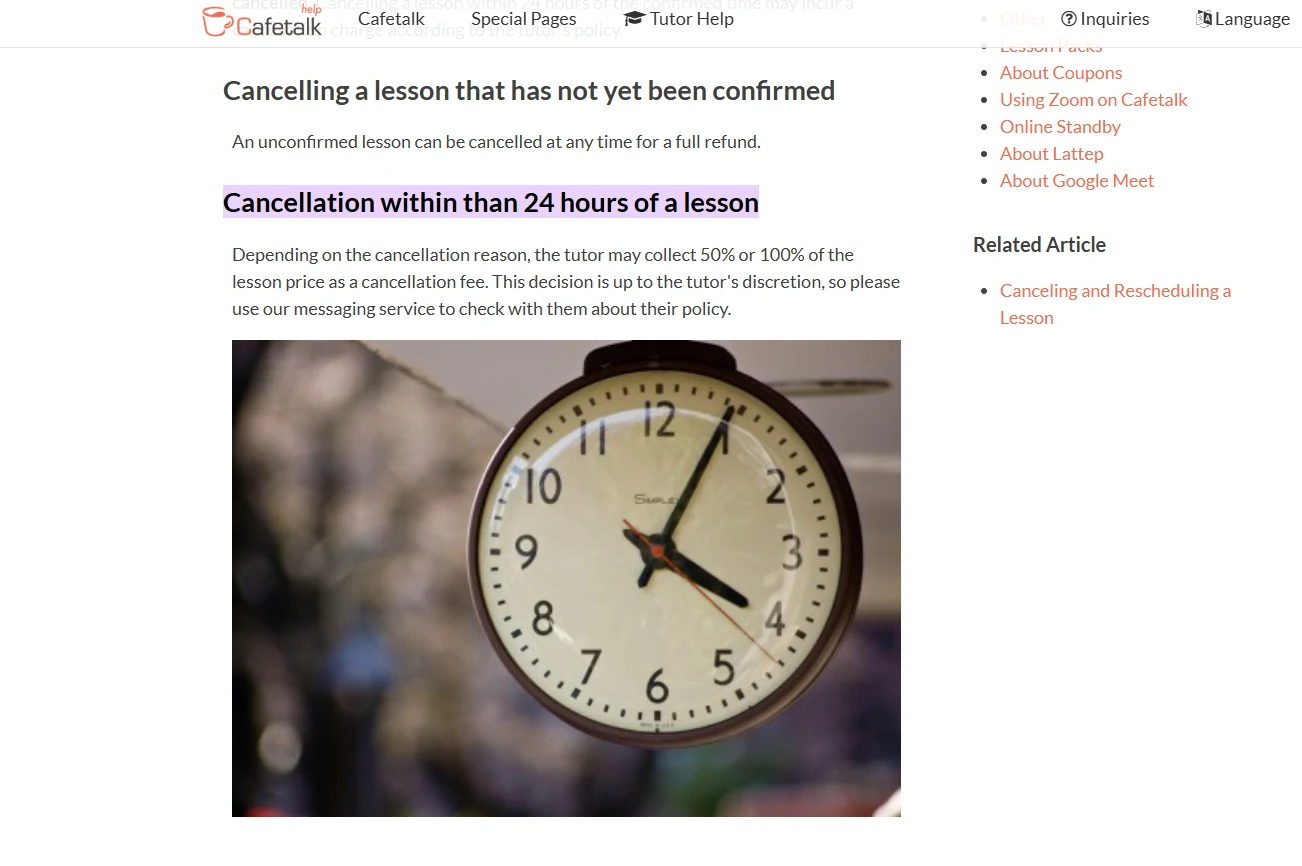
How Cafetalk’s pricing works
Payments are fully prepaid via “points.” Students buy points using credit card, PayPal or local bank transfer (Japan/Korea only). Accepted currencies include USD, EUR, GBP, AUD, etc. (in addition to JPY). There are no subscriptions or auto-charges – you only buy as many points as needed. Cafetalk runs occasional coupon campaigns (a site coupon page exists), and tutors can also offer their own discounts via points. There are no group-class discounts. Payment timing is always upfront: you purchase points first and then spend them on lessons.
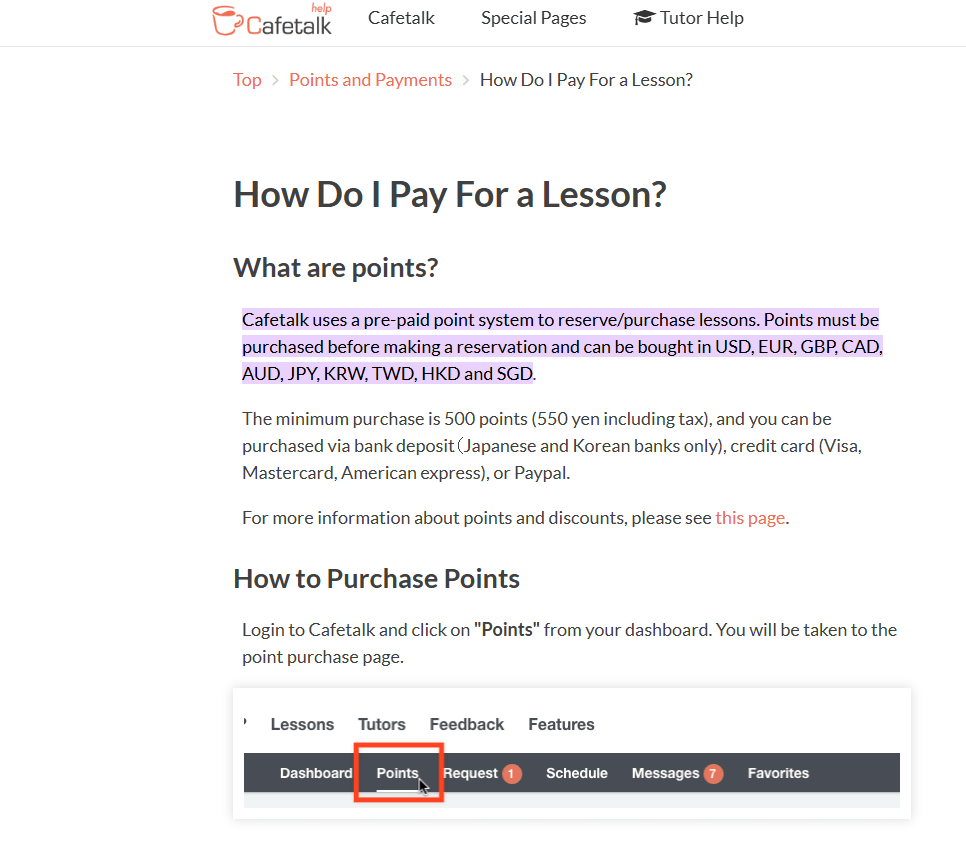
Free Trial
Cafetalk does not offer a universal free trial program. However, individual tutors may list trial lessons which can be free or heavily discounted. These appear with a “Trial Lesson” tag. Only the first lesson with that tutor can be a trial. In practice, many tutors provide a paid trial (often 30-min at reduced cost). Students appreciate this option to test a tutor with lower risk.
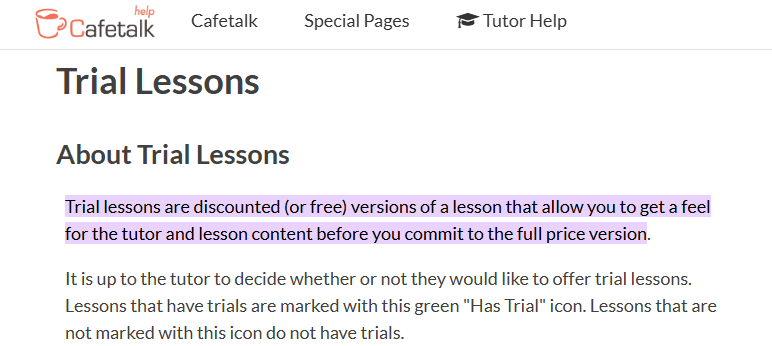
Refund policy
Cafetalk’s refund policy depends on the situation. According to their terms, unconfirmed lesson requests (or if the tutor cancels) are fully refunded points. Once a tutor confirms a lesson, canceling within 24 hours may incur a tutor-defined fee (50% or 100%). They also have a “100% Satisfaction Guarantee” program where, for the first lesson (≤3000 points) with certain tutors, you can get a full refund.
In user reviews, many report that refunds can still be hard to get. Some complain that tutors or the platform do not always grant refunds even when lessons were unsatisfactory. In other words, the refund policy is limited. Students say the official guarantee only covers specific cases, and outside of that they often lose the lesson fee when problems arise.
Cafetalk Alternatives
Students and parents often compare Cafetalk to other tutoring platforms. They might seek alternatives for better pricing, specific subjects, or different features. Below are several popular alternatives:
-
Preply
Pros: Large global marketplace (especially languages), many tutors. Students get Preply Trial (free first lesson), and tutors set prices. Commission decreases with more teaching: it starts at 100% on the trial, then 33% (tutor keeps 67%) and drops to 18% for high-volume tutors. This means experienced tutors earn more of their fee over time. Preply has an integrated classroom and lots of student traffic.
Cons: New tutors give away their first lesson for free (100% commission). The marketplace is very competitive, so standing out is hard. Many tutors report that trial-lessons consume a lot of time with no pay. Prices are comparable (tutors charge roughly $10–40/hr), but top-demand tutors can get high rates. Overall, Preply offers broad exposure, but it’s tough for beginners to gain traction with high initial commission.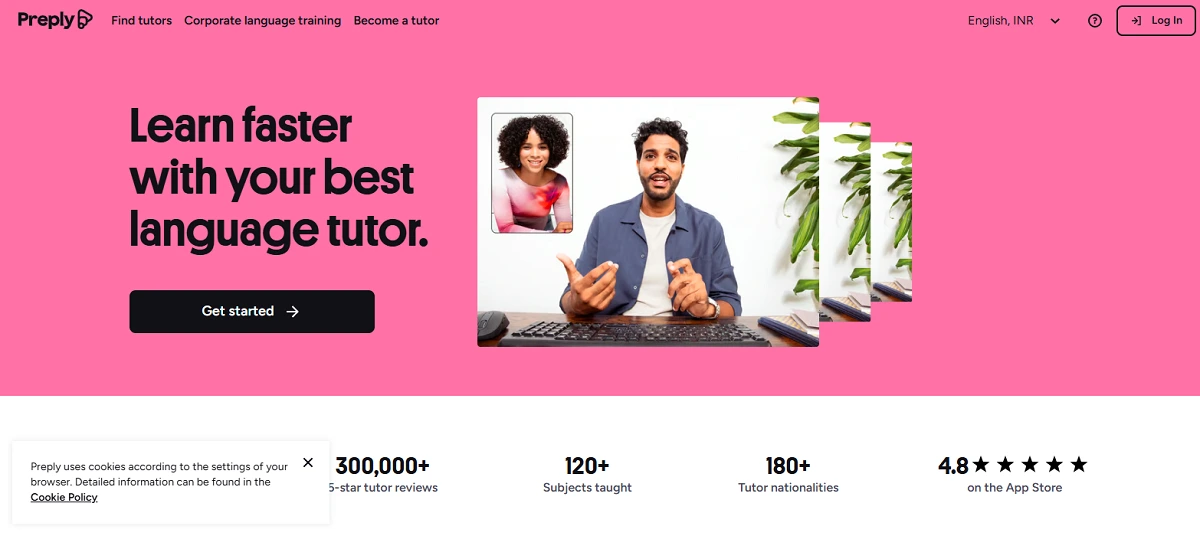
-
italki
Pros: Focuses on language learning. Massive tutor selection (thousands of teachers for 100+ languages). Tutors keep 85% of earnings (flat 15% commission), which is generous. Hourly rates range very widely ($4–$80) to fit all budgets. The platform provides an integrated video classroom (no third-party apps needed).
Cons: Restricted to languages and dialects – no music, academics, etc. There is no free trial lesson (students pay ~$30 for a 30-min trial), unlike Cafetalk where many tutors offer free/discounted trials. Tutors must handle teaching materials themselves (Cafetalk is similar). For non-language subjects or kids, italki isn’t suitable. Overall, italki excels for languages with friendly commission and huge choice, but Cafetalk covers far more subjects.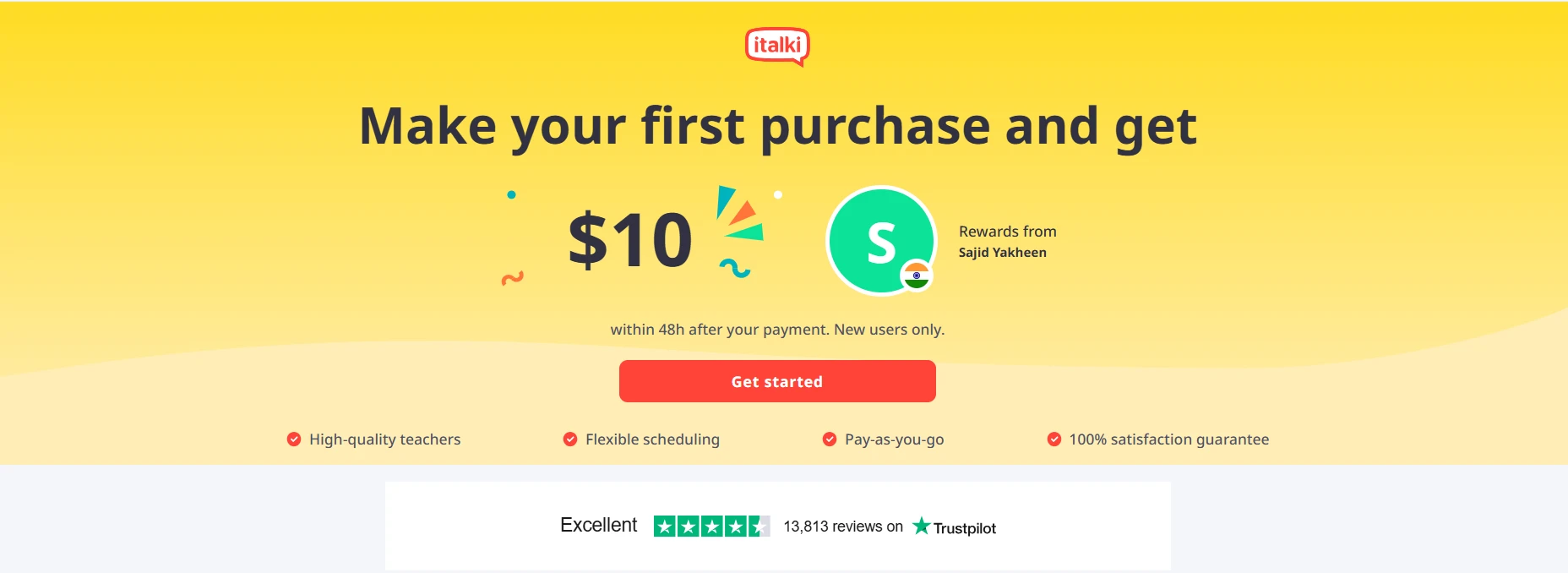
-
Wyzant
Pros: US-focused tutoring (all academic subjects). Tutors set hourly rates and keep 75% (Wyzant 25% fee). There are thousands of tutors in 300+ subjects (e.g. math, science, test prep). Average tutoring rates are quite high (around $35–$60/hr, with many above/below that). Tutors like Wyzant’s professional framework and large U.S. student base.
Cons: Primarily U.S./Canada students – not truly global. Must pass tests to join. More expensive on average than Cafetalk (so better for advanced or college tutoring). Wyzant also does not offer trial lessons. It’s a traditional tutoring marketplace with its own vetting. For global flexibility, Cafetalk has the edge, but for American K-12 subjects, Wyzant offers deeper resources.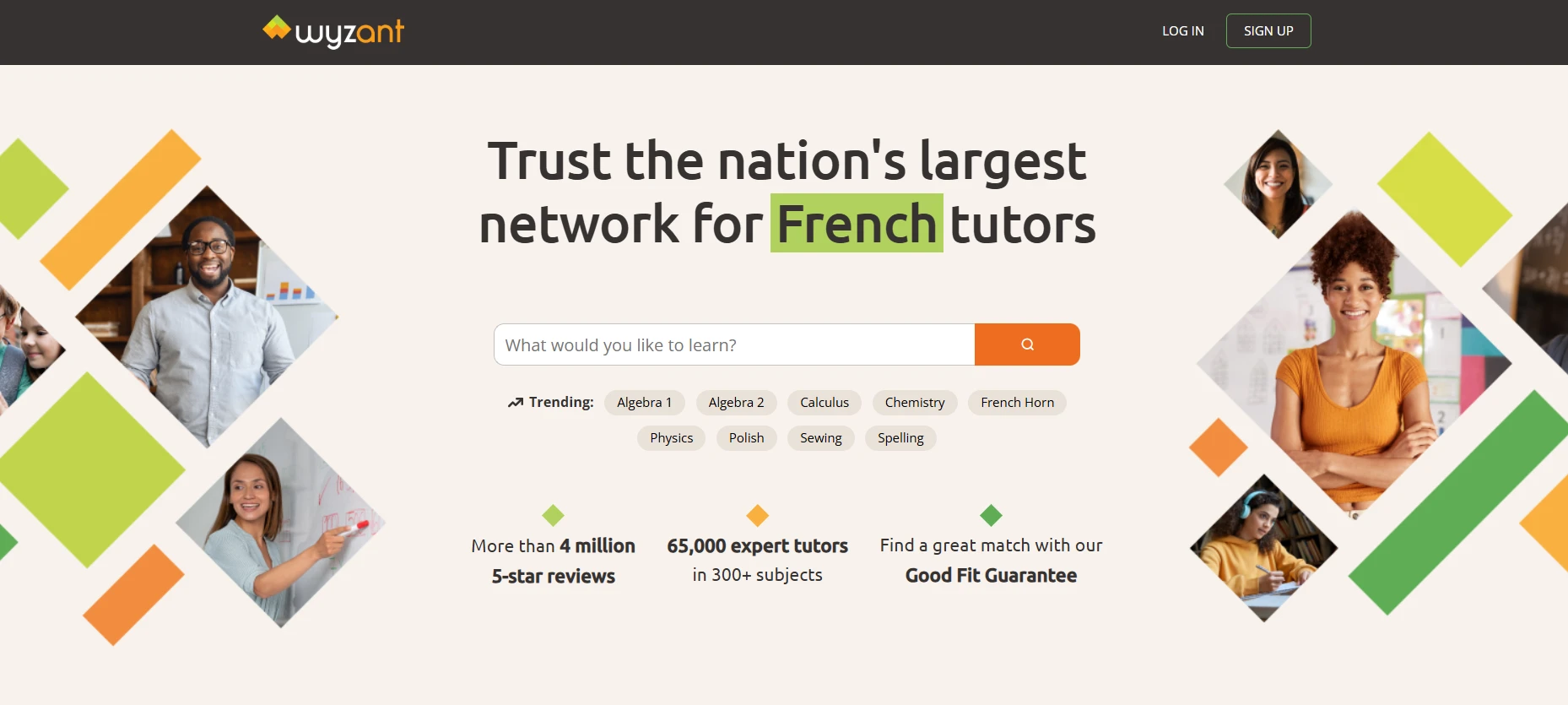
-
My Engineering Buddy
Pros: Specializes in engineering, math and science at the college/university level. Highly qualified tutors (often advanced degrees) focus on complex subjects. Students often report lower rates per hour compared to language sites, plus features like detailed homework help and 24/7 support. Personalized tutor matching and a dedicated support team are highlighted by users. Many students praise MEB for deep topic expertise and clear explanations.
Cons: Less variety (mostly STEM and some related fields). Smaller tutor pool, so scheduling is on-demand. But MEB’s niche focus is an advantage for students seeking advanced technical help.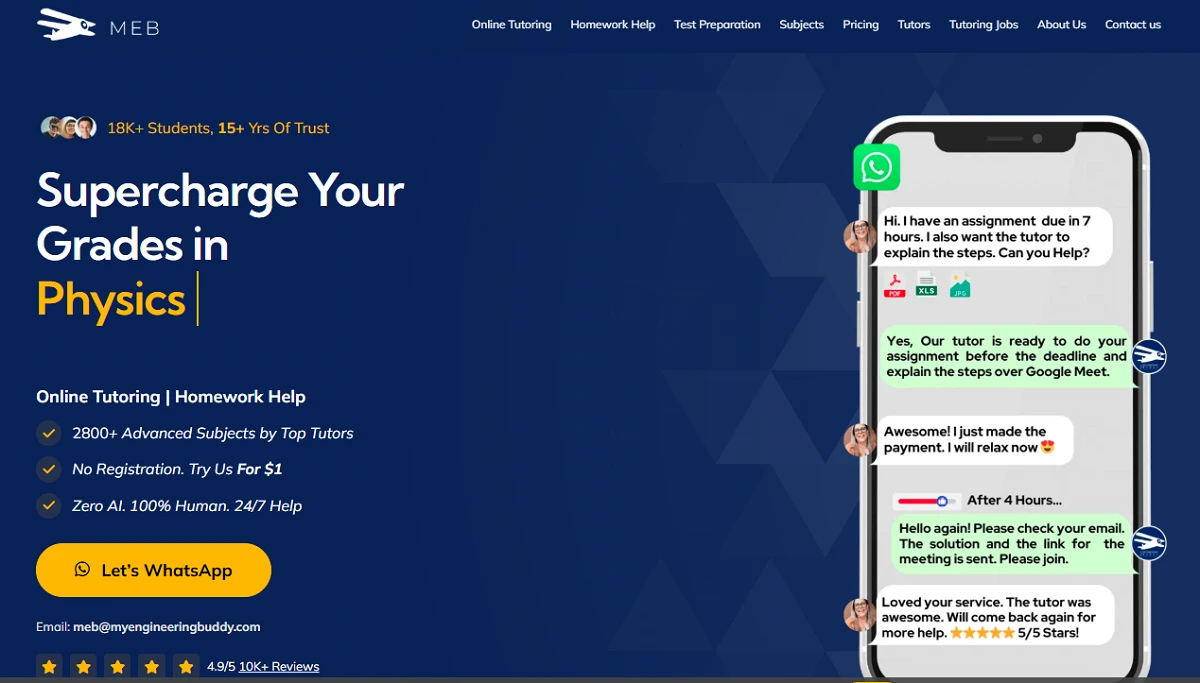
Summary of Alternatives: Students may look to alternatives when seeking specialties or better value. Preply and italki excel for language learning; Wyzant and Varsity Tutors (similar to Wyzant) cover American K-12 academics; My Engineering Buddy targets STEM and higher-ed subjects. Compared to Cafetalk, My Engineering Buddy often provides more advanced subject expertise and focused support, making it a strong choice for challenging engineering coursework.
How it Works?
A. For Students
Students sign up on Cafetalk for free. They then purchase lesson points (via credit card, PayPal, or bank transfer) to pay tutors. Once logged in, students search for lessons by category, language or price. Filters allow sorting by tutor country, experience, etc. When a lesson is chosen, the student sends a “Lesson Request” by picking a slot from the tutor’s calendar (times are shown in your local zone). The tutor either confirms the request (manually) or, if the lesson is marked “instant booking”, it’s automatically confirmed.
On the lesson day, the student joins the lesson via the agreed platform (Skype, Zoom, etc.) at the scheduled time. After the session, the student can rate and review the tutor within 7 days. Cafetalk provides live support chat (multilingual) throughout this process in case any issues arise.

B. For Tutors
Becoming a Cafetalk tutor is free. You start by registering and creating a profile that highlights your background and lesson offerings. Cafetalk requires a short interview to understand your skills. Once approved, you set up your lesson listings, set your hourly rates (in points), and publish your availability calendar. You control what and when to teach.
After each lesson, the student’s paid points go into your Cafetalk account. Tutors must accumulate at least 3,000 JPY (about $25) in earnings before requesting payout. Cafetalk pays out via PayPal, Payoneer, or bank transfer. The more lessons you teach, the higher percentage of each fee you keep (from 60% up to ~80%).
To get started, tutors can apply through the Cafetalk application page【45†】. After a quick sign-up process, you’ll be ready to teach on the platform.
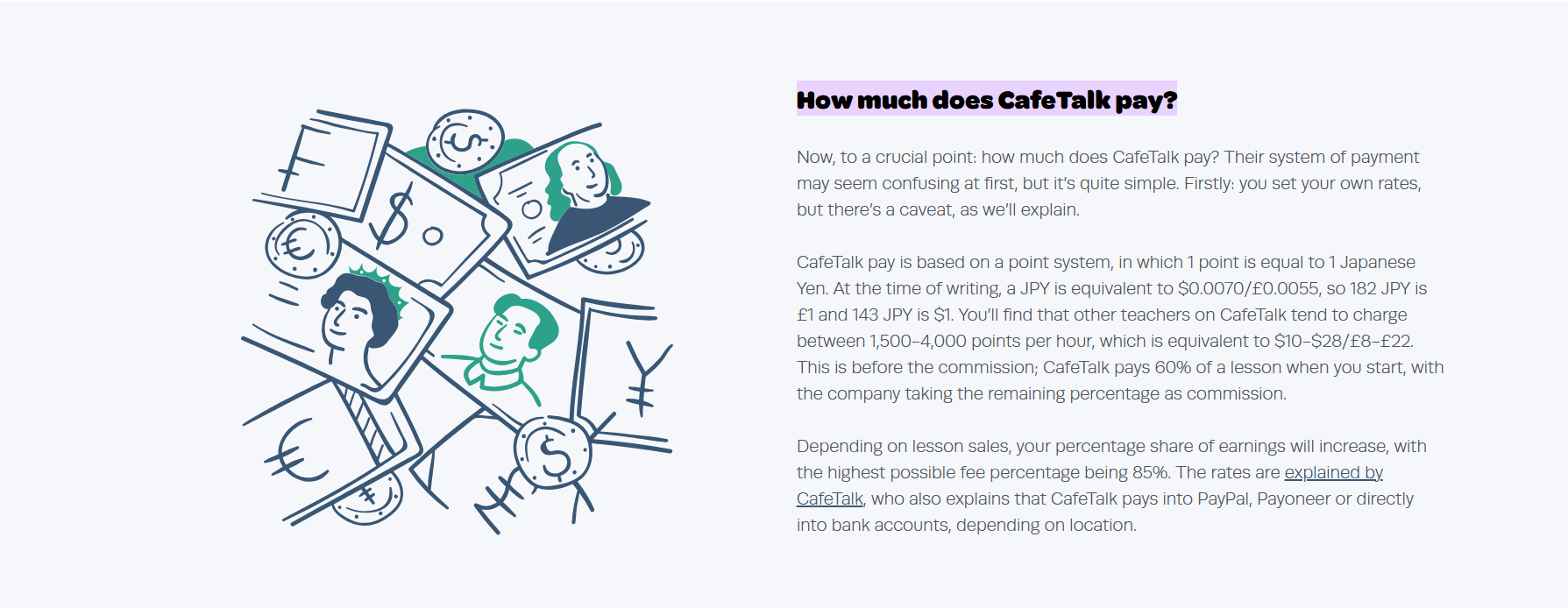
FAQs for Tutors
-
Can tutors set their own fee or is it fixed? Tutors set their own hourly rates for lessons. Cafetalk then takes a commission (40% initially) from that price; the tutor gets the rest.
-
How much can a tutor expect to earn per hour? It depends on the tutor’s rate and experience. For example, at a $20/hr rate a tutor initially keeps 60% (≈$12/hr). Experienced tutors who reach higher tiers can keep up to ~80%, earning $16/hr on a $20 class. Many English tutors charge around $12–36/hr, so typical take-home might be $7–25/hr after fees.
-
How many hours per month can a tutor expect? There is no guarantee. Tutoring hours vary greatly by tutor popularity. Some tutors report only a few hours per month, especially when starting. Top tutors who build a following can get 20+ hours/month, but many struggle to get regular bookings.
-
Is it easy to get students? It can be challenging. Reviewers say Cafetalk has many tutors and relatively few students, so new tutors must actively promote themselves. Offering trials and prompt responses helps, but some report it took weeks or months to attract repeat students.
-
Tips to get more students on Cafetalk: Improve your profile (use a clear photo, detailed bio and demo videos). Make use of Cafetalk’s promotion tools: you can create discount coupons for lessons and apply for featured tutor interviews. Offer a trial lesson (this has a green “Trial” badge) and encourage reviews from satisfied students. Be responsive and update your availability often. Active tutors also advertise on social media or forums to attract learners.
-
What tutors like about Cafetalk: Tutors appreciate the platform’s flexibility: you choose your schedule and set prices. Many mention the support from Cafetalk’s team (multilingual customer service, including English help). The variety of students from different countries is also a plus. Overall, tutors enjoy the freedom to design their own lessons and the global reach.
-
What tutors do not like about Cafetalk: The biggest complaints are low pay and few students. Many say the 40% cut is hight, and that the weak Japanese yen further reduces earnings when converted. Reviews describe Cafetalk as “a waste of time” when bookings are scarce. Overall, inconsistent work and earnings are the main negatives.
Cafetalk: Company Information
Founding: Cafetalk is run by Small Bridge Inc. Small Bridge was founded in February 2010, and shortly after launched Cafetalk (originally as an English-learning site). The founder and CEO is Kotaro Hashizume. The company is based in Tokyo (Shibuya).
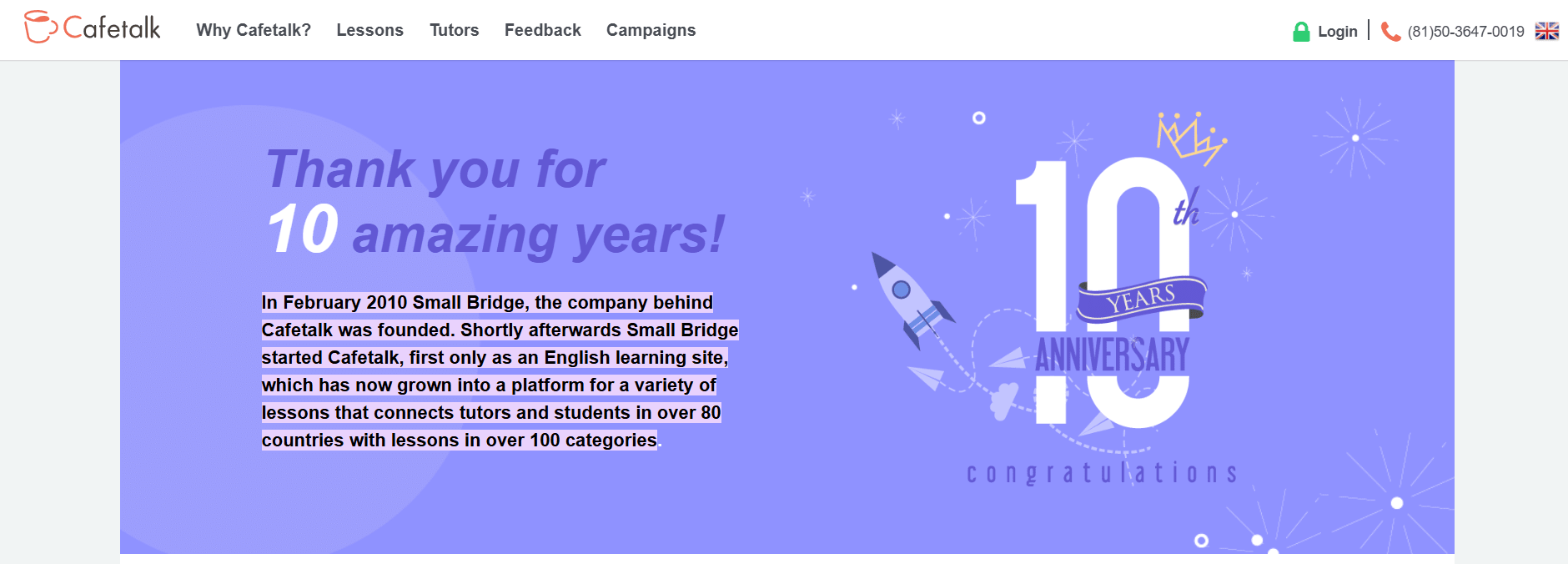
Mission & Vision: Small Bridge’s mission is to “bring down the barriers of nationality and language” by connecting students and teachers globally. Its flagship platform Cafetalk reflects this, aiming to make online lessons “fun and inspiring” across cultures.
Scale of Operation: Cafetalk operates worldwide. The Tokyo headquarters employs a small international team (Small Bridge has about 11–50 employees). They even note staff in Japan, Italy, Korea, Taiwan, Indonesia, Canada and Sweden. Students use Cafetalk in 80+ countriescafetalk.com. While originally popular in Japan and East Asia, it also serves Europe and the Americas. There are thousands of tutors on the platform, from language experts to musicians and scientists. Cafetalk does not publicly share exact tutor numbers, but staff assert hundreds of tutors offer thousands of lessons globally.
Services: Cafetalk specializes in live 1:1 lessons via video (using Skype, Zoom, etc.). It does not sell pre-recorded courses or homework answers. Services include language tutoring, academic tutoring (math, science, test prep), hobbies (music, art), lifestyle (fitness, yoga), and professional skills. They also run “seminars” and have fun lessons (chess, counseling, etc.).

Subjects Offered: Over 30 languages are taught on Cafetalk, plus many non-language categories. For example, music instruments, art & design, fitness, business, fashion, counseling, spirituality and more. In total the site lists 100+ distinct lesson categories. Math and science topics exist under “Academic Tutoring” but not as prominently as on STEM-focused sites.
Unique Features: Cafetalk highlights features such as a 100% satisfaction guarantee for first lessons. The platform supports multiple languages (interface in English, Japanese, Korean, Chinese, Italian, Spanish, German, Russian, etc.), reflecting its global reach. It offers live multilingual support 24/7. Tutor profiles often include trial lessons and student reviews. Cafetalk also lets tutors use coupons and gift-cards and provides promotional interviews for top tutors. According to company info, top tutors on Cafetalk can earn over $4,000 USD per month, illustrating its scale.
USP of Cafetalk
-
Wide range of lesson categories: Cafetalk advertises over 100+ categories. In practice, you can find lessons in dozens of fields (languages, music, art, fitness, academics, business, etc.); this is true on the platform and confirmed by its menus.
-
Tutor flexibility and autonomy: The site promises tutors set their own schedule and prices. This is indeed true. Tutors praise how they can teach anytime and design custom lessons. Students benefit by choosing from many tutors’ schedules.
-
100% satisfaction guarantee (conditional): Cafetalk advertises a refund guarantee for initial lessons. They do offer a “Satisfaction Guarantee” program, but only under specific conditions (first lesson, ≤3000 points, certain tutors). Many reviews note this guarantee is limited in practice.
-
Trial lessons: The platform allows tutors to offer trial versions of their lesson. Students like having this option to test a tutor at low cost. In reality, many tutors provide free or discounted trial sessions, which users often mention positively.
-
Global, multilingual platform: Cafetalk markets itself as breaking language barriers. The site interface is available in many languages and support staff span the globe. Users do report the platform serves students worldwide, aligning with this USP.
-
Responsive support: Cafetalk highlights round-the-clock human support. In practice, many users find their support chat helpful and multilingualcafetalk.com. This matches Cafetalk’s claim of offering “top class support”.
Drawbacks of Cafetalk
-
Strict refund terms: The advertised guarantee is very limited. Outside that, students report that tutors often keep fees (no refund). Unlike Wyzant’s unconditional trial-for-money-back, Cafetalk’s refunds are strictly at tutor discretion.
-
Low tutor compensation: Tutors keep only 60% initially, which many find high (40% platform cut). Reviews highlight this, complaining of low hourly net pay. Experienced teachers say even after many lessons, net earnings remain modest due to commission and tax.
-
Fewer students/competition: Many users warn that finding students on Cafetalk is hard. Reviews describe getting “zero students” after months. This means tutors may work long hours for little payoff. High competition among tutors makes it tough for newcomers.
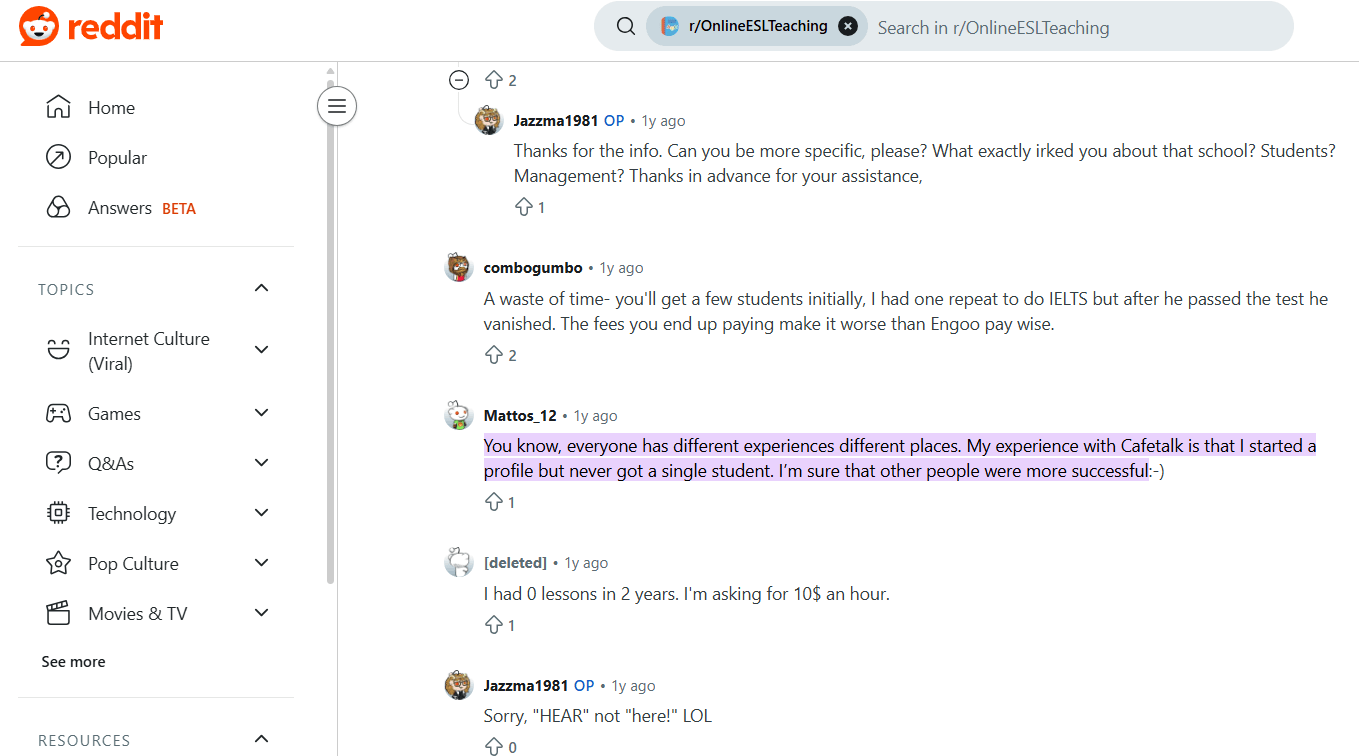
-
Currency risk: Payments are in Japanese yen, so Western tutors see their USD/EUR earnings shrink when yen is weak. This is not obvious to new tutors and effectively lowers pay compared to other platforms.
-
Limited built-in technology: Cafetalk uses external tools (Skype/Zoom) for lessons. There is no proprietary video classroom or integrated whiteboard. Some users find this less seamless than platforms with native teaching tools.
-
Geographic skew: While global, Cafetalk is especially popular in East Asia. English and subject tutors from the U.S. or EU may find fewer local students. (No secret fees, but service focus is regional.)
Comparison with My Engineering Buddy
MEB vs Cafetalk: My Engineering Buddy (MEB) excels in areas where Cafetalk is weaker for advanced learners. MEB specializes in engineering, math and science, so its tutors typically have advanced degrees and deep subject-matter expertise. This means students receive more in-depth explanations and help with complex homework than on Cafetalk. Pricing-wise, MEB’s rates tend to be competitive for STEM help. Users report that MEB tutors often charge similar or lower hourly fees compared to Cafetalk’s top tutors, and parents appreciate transparent packages for homework help.
Testimonials from MEB users: Students praise MEB for its focus on difficult topics. For example, an engineering student might say “My Engineering Buddy helped me solve a thermodynamics problem that nobody on Cafetalk could explain”. Another might note that MEB’s step-by-step guidance on a calculus assignment was invaluable. These testimonials emphasize personalized attention: MEB tutors often work through problems in real-time with the student.
Overall, students looking for complex subject expertise often find MEB more suitable. Cafetalk is general-purpose and broad, while MEB stands out for engineering and advanced STEM support. Many MEB users say they chose it specifically for difficult college-level work, which Cafetalk’s general tutors seldom focus on.
Customer Support and Policies
Cafetalk’s customer support is generally well-regarded. The platform offers 24/7 live chat support in multiple languages. Students and tutors can get quick help from a human agent (not just a bot) at any time, which they often mention positively. The refund policy, however, only guarantees satisfaction under limited terms; otherwise it relies on tutor goodwill. By contrast, My Engineering Buddy also provides dedicated support (e.g., account managers, responsive chat) and tends to have clearer refund/guarantee policies. Some MEB users feel the support is more personalized (e.g. one-on-one assistance) than on Cafetalk.
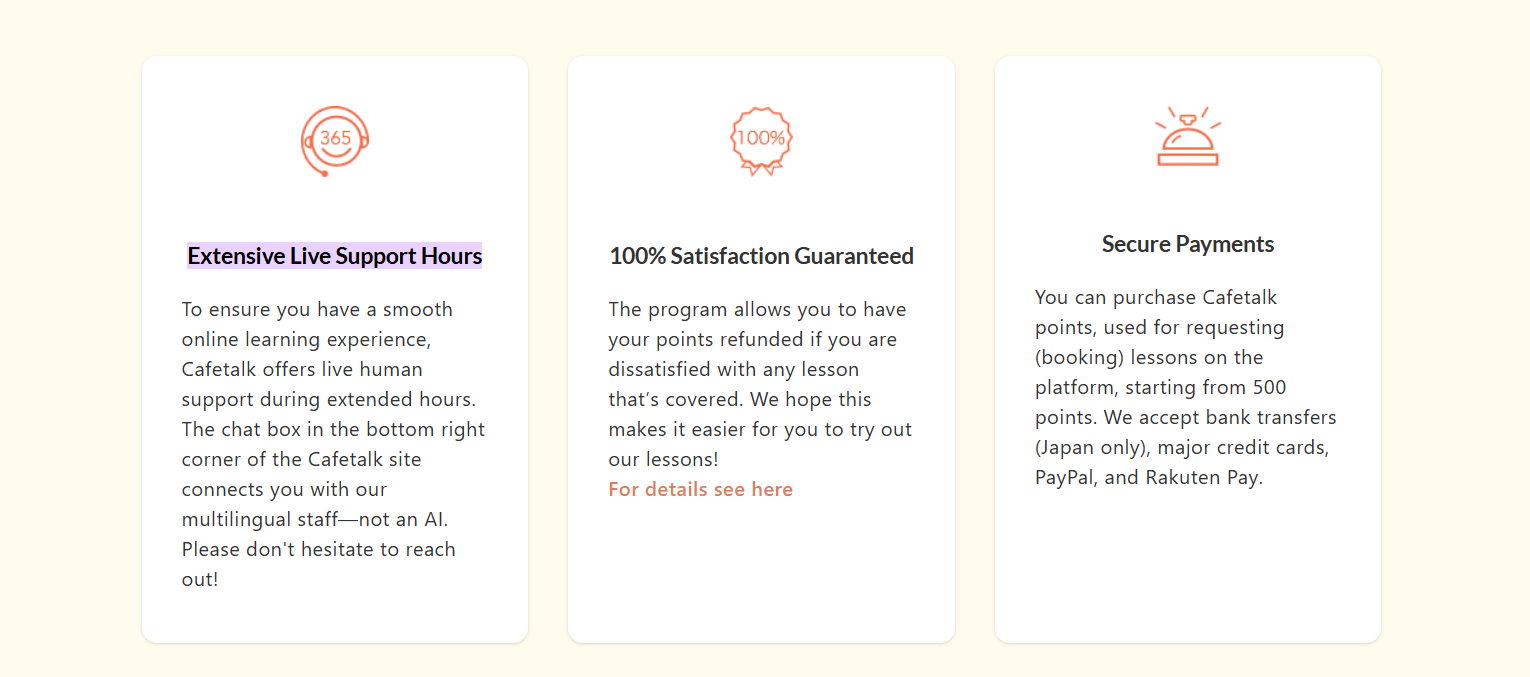
Global Reach and Localization
Cafetalk’s platform is designed globally. It supports many languages in its interface (English, Japanese, Korean, Chinese, Italian, Spanish, German, Russian, etc.). Its student base spans countries (notably Japan, Korea, Taiwan, China, and also Europe/Americas). However, the strongest user concentration is Asia. The multilingual site and staff help non-English speakers.
My Engineering Buddy also serves a global audience (primarily English-speaking), but currently with fewer language options in the interface. Both platforms allow students from anywhere to connect to tutors, but Cafetalk has gone further in localization (with localized site versions).

Cafetalk’s future plans
Cafetalk has not publicly announced any major new features recently. They do offer lessons on advanced tech topics (e.g., a “Crash Course in AI” lesson), but this appears as user content, not platform AI. We found no news of Cafetalk integrating artificial intelligence into its system; it seems focused on core tutoring features and expanding lesson categories. The site’s future likely involves broadening its service (adding more subjects or markets) and possibly improving its tech (the company’s global support suggests investment in platform growth).
Regarding AI specifically, Cafetalk mentions AI only as a lesson topic. There is no evidence that Cafetalk itself uses AI tools (like matching algorithms or AI tutors) on its platform at this time. In summary, while the e-learning industry is exploring AI, Cafetalk has not indicated any AI-driven plans; it seems to be consolidating its existing model and growing its user base.
FAQs About Cafetalk
Q: How does Cafetalk compare to My Engineering Buddy?
A: Cafetalk is a broad tutoring marketplace with many topics (languages, arts, etc.), while My Engineering Buddy focuses on STEM and engineering help. MEB typically offers deeper expertise in those areas and more personalized homework support. Cafetalk has more variety of tutors, but MEB often provides better value and targeted assistance for advanced engineering coursework.
Q: Is Cafetalk free to join?
A: Yes, creating a student or tutor account on Cafetalk is completely free. There are no sign-up or monthly fees. Students only pay for the lessons they book (using prepaid points).
Q: Who can become a tutor on Cafetalk?
A: Almost anyone with teaching skills can apply. Cafetalk encourages native or fluent speakers for language lessons and prefers qualified educators. For example, English tutors are expected to be native speakers with at least a bachelor’s degree. However, subject experts (e.g. math, music) with strong knowledge can also teach. Cafetalk verifies credentials via a short interview.
Q: What subjects are available on Cafetalk?
A: A very wide range. Cafetalk offers language lessons in over 30 languages. Beyond languages, it has categories like Music, Art & Design, Cooking, Yoga, Business, Academic Tutoring (math, science, test prep), IT & Programming, Fashion/Beauty, and more. In total the site lists over 100 distinct lesson categories.
Q: Does Cafetalk have trial lessons?
A: Tutors may offer trial lessons (marked on their profile) which are usually shorter or cheaper than a full lesson. These are free or discounted trial versions that let you try a tutor with less commitment. Only the first lesson with a tutor can be a trial. There’s no blanket “free trial” program; trial availability depends on each tutor’s settings.
Q: How does Cafetalk’s cancellation policy work?
A: If a lesson is not confirmed (or if the tutor cancels), the lesson fee is fully refunded. If the tutor has already confirmed, cancelling less than 24 hours before may incur a fee (the tutor may charge 50–100% of the lesson). Be sure to check each tutor’s cancellation rules.
Q: Is Cafetalk only for English/Japanese or other languages?
A: It is an international platform, not limited to one language. While Cafetalk started in Japan, it supports many languages (site UI in English, Japanese, Korean, Chinese, etc.) and has tutors teaching dozens of languages. If you need instruction in French, Spanish, Arabic or any other language, Cafetalk likely has tutors.
Q: Are there customer support or guarantees?
A: Yes. Cafetalk offers around-the-clock multilingual customer support (live chat). They also have a limited 100% Satisfaction Guarantee (refund for first lessons under certain conditions). Outside that, their policies are as described above.
Conclusion
Cafetalk’s strengths include flexibility, broad lesson options, and 24/7 multilingual support. Students enjoy the pay-as-you-go model and range of tutors. However, its weaknesses are high commission (lowering tutor pay), sometimes strict refund rules, and lower booking volume for tutors.
In contrast, My Engineering Buddy specializes in technical subjects, often giving users deeper expertise and more personalized help. MEB tends to offer competitive pricing for advanced tutoring, which can be more appealing for rigorous academic needs. For students seeking complex STEM or engineering help, My Engineering Buddy is a strong alternative, while Cafetalk is a versatile platform for general tutoring across many categories.
Regardless of choice, users should weigh Cafetalk’s flexibility and support against its pricing and refund policies. And if you need specialized engineering or math help, consider MEB’s focused approach.
******************************
This article provides general educational guidance only. It is NOT official exam policy, professional academic advice, or guaranteed results. Always verify information with your school, official exam boards (College Board, Cambridge, IB), or qualified professionals before making decisions. Read Full Policies & Disclaimer , Contact Us To Report An Error

